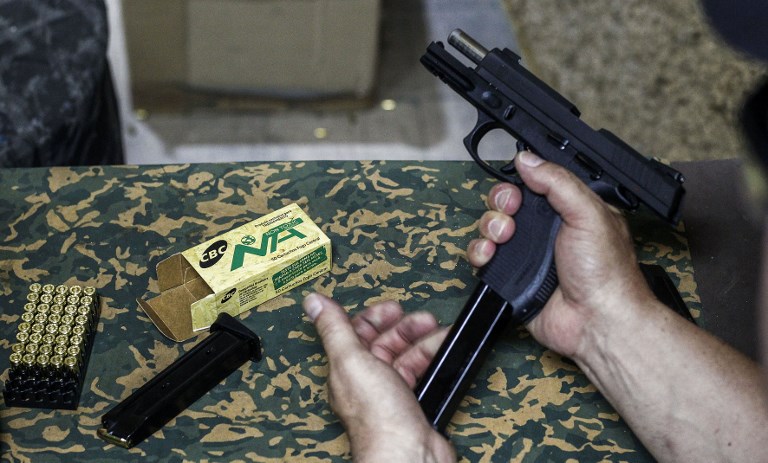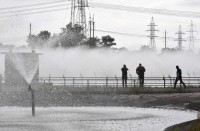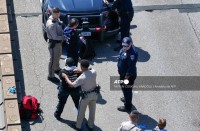
by Paula RAMON
Agence France Presse
SAN PAULO, Brazil (AFP) — Silvana Tavares, a long-time sports shooter who is a vendor in a firearms store in Sao Paulo, says she has never brandished a weapon at anyone, and she does not want to kill anyone.
But she is determined to keep a gun at home.
“Nobody goes into a gun shop thinking they’re going to kill,” said Tavares, who is a supporter of President Jair Bolsonaro’s looser gun ownership laws.
Vera Ratti, who owns the store where Tavares sells guns, is also a fan of the right-wing leader’s new approach to the fight on crime, which he signed into law on Tuesday.
“From the start of humanity, people have to defend themselves. Here in Brazil, that’s part of our culture,” she argued.
“Criminals look for easy targets. The fact that there could be guns in a shop, in a home — that could deter them.”
But not everyone is on board for the weakened restrictions — the fulfillment of a campaign promise by Bolsonaro, a far-right former paratrooper who has pledged a hard line on crime.
Risk of violence
Edson, a 36-year-old taxi driver, already has a gun — one bought illegally, for which he doesn’t have a permit. He said he has used it once to wound someone, and he carries the scars of three bullets.
Despite all that, he is against guns being more freely available to all.
In his view, the decree will not solve Brazil’s chronic violent crime problem. The country recorded nearly 64,000 murders in 2017, many of them gun-related.
“We have to invest in education. We’re so far behind in that that even if the government focused all its efforts on it today, it would take 30 years to make a difference,” he said.
For him, Edson said, his gun is about survival because he lives in a dangerous neighborhood.
But more guns, he said, “will only bring violence.”
Not for everyone
Others who, like Edson, have been on the receiving end of violent crime were more welcoming of Bolsonaro’s measure, which makes it much easier for those over the age of 25 with no criminal record to buy up to four guns..
“I think this decree is a good idea because I myself was a victim of a robbery last week,” said Ricardo, a 43-year-old shop owner who declined to give his last name.
“The thugs pointed a gun at my head and I couldn’t defend myself. So I agree with it.”
The decree does not extend to carrying weapons — concealed or otherwise — in public, which remains restricted to police, public or private security personnel, and the military.
What it does do is broaden the scope of who can legally possess firearms and make them more readily available.
At Ratti’s gun shop, there is a small, three-lane shooting range where Tavares — who came third in a state shooting championship — and other practice their aim.
Luis, a 50-year-old private security employee, says between firing off rounds at the range that guns will not necessarily become more commonplace, as buying one is not financially within everyone’s reach.
A minimum price for a handgun is around 4,000 reais, or about $950. On top are the costs of the permit and administrative checks.
“People who don’t like chocolate aren’t going to start eating it just because a shop has a sale,” Luis said.
Power play?
In the streets of Rio de Janeiro, opinion also was polarized.
“I don’t have a gun, or the right to carry one. But I want to have one at home as soon as it’s possible,” said Douglas Rodrigues, a parliamentary assistant.
Daneille Santiana, a 25-year-old aviation student, was pessimistic about the decree’s possible consequences.
“I think it will create more violence because a lot of people will use this occasion to get a gun to lord over other people under the pretext that they have the power,” she said.
© Agence France-Presse







